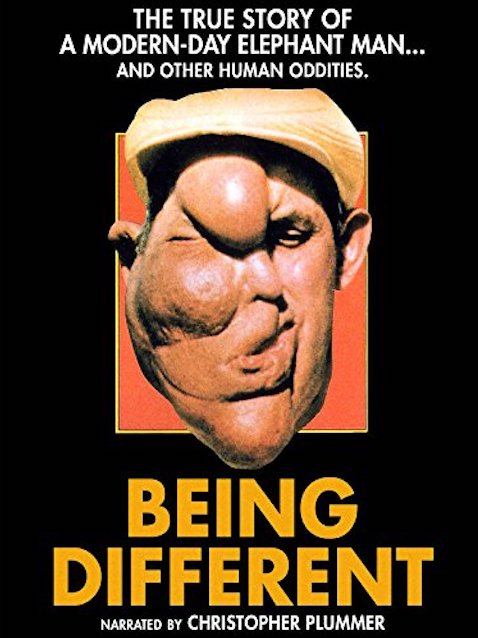Monday, July 19, 1982
BEING DIFFERENT. Music by Paul Zaza. Written, produced and directed by Harry Rasky. Running time: 101 minutes. Mature entertainment.
TOD BROWNING WAS A story teller. As a boy, he'd grown up among circus folk. He’d stood on the midway and watched the mixture of fear and fascination on the faces of people who paid to see his friends, the human oddities.
As a filmmaker, Browning is probably best remembered as director of the 1931 Dracula. His most controversial work, however, paid tribute to his carnival companions. It was a film that featured a cast of Freaks.
First released 50 years ago [1932], Freaks offered audiences a drama set within the circus world, and portrayed the physically deformed as matter-of-fact characters in a human drama. Over the years, it has come to be recognized as a genuinely heart-felt artistic statement.
Harry Rasky is a documentarist. Best known for his television profiles of such artists as Marc Chagall and Tennessee Williams, he seems somehow out of place on Browning's midway, musing on the mysteries of Being Different.
And yet, here is Christopher Plummer peering into a funhouse mirror at a distorted reflection of his own famous features, and asking (in writer-director Rasky's words) "suppose the mirror will never come back?"
Being Different looks at people for whom the distorted mirror image is reality. Rasky introduces us to 18 physically abnormal people, and attempts to show us how they cope.
At first, we meet some professional exhibits — a group that includes a midget fire-eater, the Viking giant, a fat man, a bearded lady and a set of Siamese twins — and we learn that they're just folks getting by.
Moving off the midway, Rasky show us a selection of "different" people living relatively ordinary lives in average communities. Here we meet Bob Melvin, a contemporary Elephant Man, as well as a footless marathoner, a legless auto mechanic and a single mother who was born with no arms.
These folk, Plummer assures us every so often, offer living proof of "the triumph of the human spirit." Positive, uncomplaining and uniformly glad to be alive, they are indeed a remarkable group of people.
Even so, I couldn't shake the feeling that Being Different is too self-consciously well-intentioned, a film rather desperate to mask its less than wholesome voyeuristic tendencies with good will. All things considered, I think perhaps the old carney Browning made a more honest film.
The above is a restored version of a Province review by Michael Walsh originally published in 1982. For additional information on this archived material, please visit my FAQ.
Afterword: Harry Rasky made a career of being different. At a time when non-fiction filmmaking was synonymous with Canada’s National Film Board, he was one of the young reporters who founded the news documentary department at the CBC in Toronto. The time was 1952, and the national broadcaster was launching its television network. After a few years, he moved to the U.S., where a New York Times critic coined the term “Raskymentary” to describe his distinctive, highly personal cinematic style, with its blend of narration, music, poetry and fictional film elements.
Fame (and award show honours) gave him clout, and in 1972 he returned to Canada to sign a dream contract with CBC-TV. For the next decade, he was guaranteed an annual salary of $50,000, for which he was was required to produce one documentary a year. He chose the subjects and exercised complete control over the final edit. Among the results of this arrangement was his most acclaimed film, 1977’s Homage to Chagall: The Colours of Love. The first made-for-TV documentary to receive wide theatrical release, it earned Rasky a Director’s Guild of America Award and an Academy Award nomination.
At the height of his fame, he expressed a disdain for most television programming, observing somewhat presciently that it had “degenerated down to a comic strip level. The comic strips of the newspapers have become the mass literature of America.” Though he could see the times changing, he wasn’t about to change himself. In 1995, he returned from a trip to find that his contract had been terminated. “Budget cuts” necessitated his removal from the CBC payroll. During his final decade, he was truly an independent filmmaker.
When he died in 2007, the obituary writers noted that the Toronto-born Rasky had made more than 50 feature-length documentaries. Overall, his work earned him some 200 international prizes and citations, including several Peabody Awards, an Emmy, and two Oscar nominations. An outlier among his films celebrating art and artists, Being Different was mostly ignored.
Perhaps worth noting is the fact that his picture arrived in theatres eight months after the release of director David Lynch’s biographical drama The Elephant Man. That Oscar-nominated feature told the story of John Merrick, whose facial deformities made him a celebrity circus attraction in late 19th century Britain. No coincidence, then, that contemporary American Robert Owen ‘Bob’ Melvin who, not unlike Merrick, suffered from neurofibromatosis, was featured on the poster art for Rasky’s 1981 doc.
